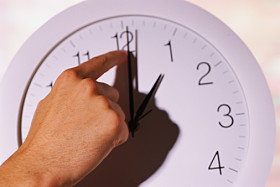Don’t Let Daylight Saving Time Ruin Your Monday
As the summer heat dwindles through September and October and the leaves start to change color, the workforce of America is always reminded that they will soon be experiencing a particular change in their daily routine. While it is getting colder outside, the weather is not the particular change we’re alluding to. The change that the workforce experiences, one which can cause disruption in the workplace, will occur on Sunday, November 7th, when the clocks must be set an hour back for Daylight Saving Time (DST).
During this particular “Fall Back” Daylight Saving event, the time we normally read will be set back one hour. For example, if you routinely wake up on Sunday mornings at 9 am, the actual time should read 8 am after DST takes effect. This time change will give you the sense that you have “gained” an hour of sleep, as opposed to the “Spring Forward” DST event, where you feel like you’ve “lost” an hour.
Regardless of which DST event is taking place, this time change can cause problems for employers come Monday morning. If employers are planning to adjust all clocks throughout the workday, complications may ensue. In hospitals, for example, doctors and nurses may make incorrect recordings for a patient’s time in and out of surgery. In manufacturing, dock workers may record several deliveries as an hour late, when drivers were actually on time as scheduled.
To avoid these situations on Monday morning, employers should make sure all clocks within the facility are adjusted for the time change by Sunday. By doing so, employees are not enabled to mistakenly take the time from an inaccurate clock.
There are many options open to the employer on how to go about adjusting each clock in the building, but the most efficient option is the implementation of synchronized clock systems. With synchronized clocks, particularly from The Sapling Company, all clocks within the facility will automatically adjust in the event of DST, so on Monday morning when employees arrive at work, the correct time will be displayed throughout the facility. If employers provide employees with an accurate time when they arrive for work Monday morning, the common disruption associated with Daylight Saving Time will be non-existent.

